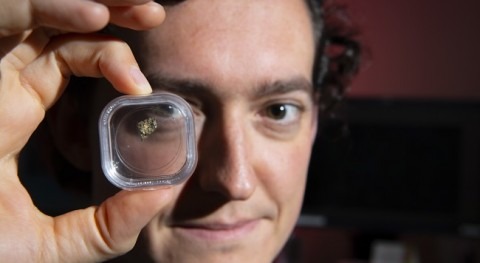A new method of extracting hydrogen from water more efficiently could help underpin the capture of renewable energy in the form of sustainable fuel, scientists say.
In a new paper, published in the journal Nature Communications, researchers from universities in the UK, Portugal, Germany and Hungary describe how pulsing electric current through a layered catalyst has allowed them to almost double the amount of hydrogen produced per millivolt of electricity used during the process.
Electrolysis, a process which is likely familiar to anyone who studied chemistry at high school, uses electric current to split the bonds between the hydrogen and oxygen atoms of water, releasing hydrogen and oxygen gas. If the electric current for the process of electrolysis is generated through renewable means such as wind or solar power, the entire process releases no additional carbon into the atmosphere, making no contributions to climate change. Hydrogen gas can then be used as a zero-emission fuel source in some forms of transport such as buses and cars or for heating homes.
The team’s research focused on finding a more efficient way to produce hydrogen through the electrocatalytic water splitting reaction. They discovered that electrodes covered with a molybedenum telluride catalyst showed an increase in the amount of hydrogen gas produced during the electrolysis when a specific pattern of high-current pulses was applied. By optimising the pulses of current through the acidic electrolyte, they could reduce the amount of energy needed to make a given amount of hydrogen by nearly 50%.
Dr Alexey Ganin, of the University of Glasgow’s School of Chemistry, directed the research team. Dr Ganin said: “Currently the UK meets about a third of its energy production needs through renewable sources, and in Scotland that figure is about 80%.
“Experts predict that we’ll soon reach a point where we’ll be producing more renewable electricity than our consumption demands. However, as it currently stands the excess of generated energy must be used as it’s produced or else it goes to waste. It’s vital that we develop a robust suite of methods to store the energy for later use.
“Batteries are one way to do that, but hydrogen is a very promising alternative. Our research provides an important new insight into producing hydrogen from electrolysis more effectively and more economically, and we’re keen to pursue this promising avenue of investigation.”
Since the level of catalytic enhancement is controlled by electric currents, recent advances in machine learning could be used to fine-tune the right sequence of applied currents to achieve the maximum output. The next stage for the team is the development of an artificial intelligence protocol to replace human input in the search for the most effective electronic structures use in similar catalytic processes.
The paper, titled ‘The rapid electrochemical activation of MoTe2 for the hydrogen evolution reaction’, is published in Nature Communications.






